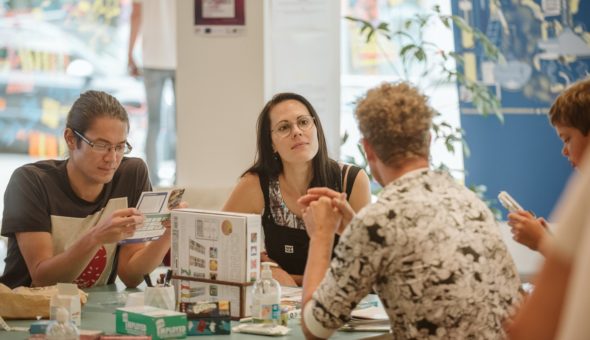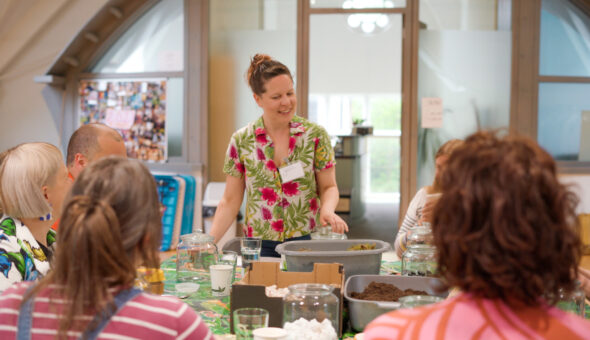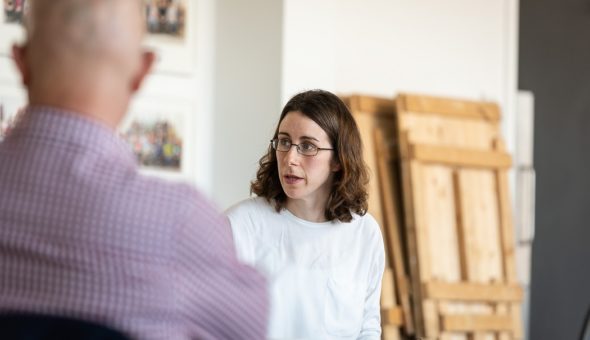Moving into year two (well, technically 2.5) of our ParticipatoryResearc@Bath project, a big focus of our work over the autumn will be our grant scheme, and sticking to the participatory principles the project, we’re testing out participatory grant-making for this fund.
Our approach to the Research England Participatory Research funding allocation has been to take a culture change approach. We’re working to understand current participatory research practice, the needs of our colleagues and communities outside the University, and putting in place initiatives to support and enhance participatory approaches to research.
Changing our approach to grant-making
Based on our work with other culture change projects, we knew from the outset of the project that colleagues would want financial support to undertake participatory research.
We’ve been using Sarah Banks’ definition of Participatory Research, which states that this type of research “involves people whose lives are the subject of study in some or all aspects of research design, process, dissemination, and impact, with a focus on generating socially just change.” We particularly note the phrase “some or all aspects of research design”. For us, research design doesn’t start with the academic or even a community organisation, it starts with the funding.
There are also many critiques of conventional funding approaches, which note that it upholds inequalities, doesn’t recognise the expertise of those who need the money most, supports extraction, and tend to reflect the broader injustices in society by being racist, ableist, sexist and heteronormative. Not least, it's also time-consuming.
Our Engage Grants funding scheme, which has been running since 2013 and distributed around £200,000, is based on a conventional grant-making model. This approach reflects the funding traditions our academics are very familiar with, and going with those traditions has been a valuable tool to help us in our work to embed public engagement with research at the University. However, given the emancipatory nature of participatory research, this approach didn’t sit well with us.
How could work funded through a call that was created by us, had a process created by us, had criteria defined by us, and was assessed by us possibly be truly participatory?
Shaping our thinking to grant-making
Since finding out about the Research England funding allocation, we’ve deliberatively chosen to take our time to think about the approach we wanted to take to our funding scheme. We didn’t want to rush it so have been learning with and through a few initiatives.
- We’ve been talking to colleagues who have run grant schemes with their funding allocation at other universities such as Imperial College London, University of Plymouth, University of Bristol and Queen Mary University. This has been invaluable, and we’re grateful for their time and generosity as they shared their experiences.
- We’ve been fortunate enough to be part of an action learning programme, Power Shift, with people in all sorts of organisations including local authorities, member-led organisations, and charities exploring governance and the transformational role it could play in creating change for a more fair and just society. Being part of this group has helped us with our ambitions and the language to explain them.
- And finally, we’ve been watching the grant-making work of others carefully: the Ideas Fund, the British Academy, the Watershed, and the Participatory Grantmakers community. We’ve also actively sought the expertise of colleagues who have acted as critical friends, supporting us to articulate and put into context what we’re thinking.
Our ParticipatoryResearch@Bath funding call
Through all this work, we’ve seen people and organisations explore new ways of distributing resources.
We are keen to build on those experiences and aim to co-create the funding call to distribute £50,000 of our £89,000 from the 2023/24 Participatory Research funding allocation.
To our knowledge, we’re not aware of it happening in universities. This is very much an experiment but is not without a lot of preparation and thinking.
Over the autumn, we’ll be working with community-based organisations and a group of researchers to co-create the call in anticipation of opening the call early in 2024, if that’s what the group we convene decide.
If you’ve taken a participatory/co-produced approach to allocating funding for participatory research, we’d love to hear from you. And if you are a researcher at the University of Bath who would like to be involved in developing the call, do get in touch.
Helen Featherstone is Head of Public Engagement at the University of Bath.
Respond



